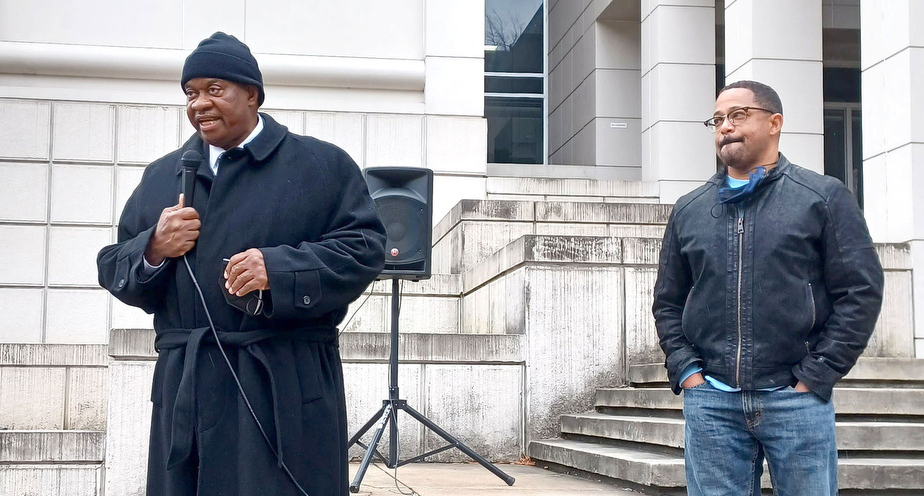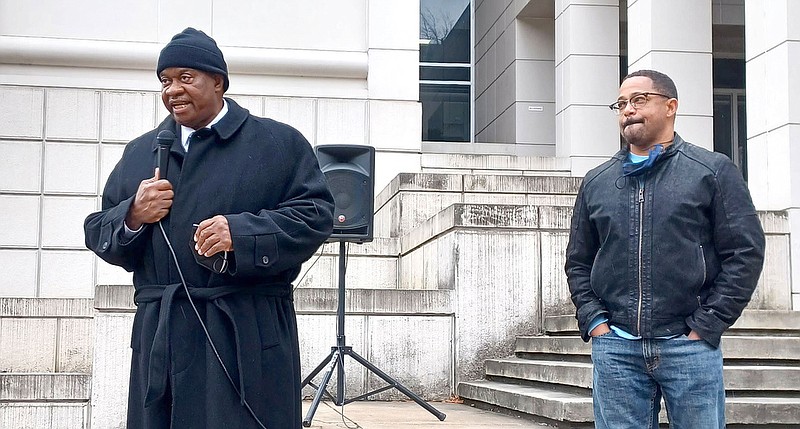 Staff Photo La Shawn Pagan / State Rep. Yusuf Hakeem, D-Chattanooga, and activist Rahim Buford speak Monday on the steps of the Chattanooga city courts building on Market Street during a news conference in support of a bill that would allow some state prison inmates sentenced to life imprisonment for first-degree murder to seek parole after serving 25 years instead of 51 years.
Staff Photo La Shawn Pagan / State Rep. Yusuf Hakeem, D-Chattanooga, and activist Rahim Buford speak Monday on the steps of the Chattanooga city courts building on Market Street during a news conference in support of a bill that would allow some state prison inmates sentenced to life imprisonment for first-degree murder to seek parole after serving 25 years instead of 51 years.After passing the Tennessee Senate last year with bipartisan support, a bill that would allow some state prison inmates sentenced to life in prison for first-degree murder to seek parole after serving 25 years instead of 51 years has hit a snag in the House.
Rep. Dan Howell, R-Georgetown, the primary sponsor of the bill, said in a statement to the Times Free Press on Monday that he is removing his name from the measure.
"Our criminal justice system must be balanced with accountability and a path for redemption," said Howell, who never moved the bill last year. "After careful consideration and counsel with district attorneys, judges, victims and other stakeholders across our state, I have decided not to move forward with House Bill 1532."
Howell said he doesn't think "the victims of violent crimes will be best served by this legislation. I'm very encouraged by proposals to rewrite and reform existing [sentencing] ranges in our criminal sentencing code so that they more accurately reflect time actually served."
State Rep. Yusuf Hakeem, a Chattanooga Democrat, said at a Monday news conference with other bill advocates that he would be proud to sign on as a co-sponsor of the bill.
"It is a very meaningful endeavor that we are undertaking," he said. "This bill would indeed afford people an opportunity to see light at the end of the tunnel."
Tennessee law provides that people convicted of first-degree murder can be sentenced to death, life imprisonment or life with the possibility of parole.
According to a legislative fiscal note on the bill, release eligibility for defendants receiving a sentence for first-degree murder is only available for certain defendants who committed the offense between Nov. 1, 1989, and July 1, 1995, while those convicted after July 1, 1995, are required to serve at least 51 years before becoming eligible for parole consideration.
The bill says any defendant who is sentenced to life imprisonment for first-degree murder would be eligible for release after serving 60% of 60 years, with a minimum 25 years required prior to parole consideration.
According to the fiscal analysis, Tennessee has 1,544 offenders incarcerated for the offense of first-degree murder with life imprisonment where the offense occurred on or after July 1, 1995. Under the proposed legislation, such individuals will be eligible for parole after serving 25 years. The analysis assumes the legislation would result in an annual average of five offenders paroled after serving 25 years.
 Staff photo La Shawn Pagan / Joe Jenkins, founder of an organization that helps convicts to reenter society after prison, speaks Monday on the steps of the Chattanooga city courts building on Market Street during a news conference in support of a bill that would allow some state prison inmates sentenced to life imprisonment for first-degree murder to seek parole after serving 25 years instead of 51 years.
Staff photo La Shawn Pagan / Joe Jenkins, founder of an organization that helps convicts to reenter society after prison, speaks Monday on the steps of the Chattanooga city courts building on Market Street during a news conference in support of a bill that would allow some state prison inmates sentenced to life imprisonment for first-degree murder to seek parole after serving 25 years instead of 51 years.
CHATTANOOGA SUPPORT
As Chattanooga residents recognized Martin Luther King Jr. Day on Monday, Hakeem and other proponents held a news conference on the steps of the city courts building on Market Street in support of the parole measure.
"This is the perfect day, I think, to demonstrate what it means to let freedom reign on a different level," said Rahim Buford, founder of the Nashville-based Unheard Voices nonprofit organization. "Out of Chattanooga, Hamilton County, there are 15 individuals who are serving 51-year life sentences. These life sentences actually are death sentences, because they will not survive long enough to be released. Even if they survive, they won't have a quality of life."
The Rev. Jeannie Alexander, co-founder and executive director of No Exceptions - an organization aimed at reforming sentencing laws and prison conditions while working to abolish all private prisons - said her opinions on sentencing were strongly affected by her work as a chaplain at the Riverbend Maximum Security Institution in Nashville.
"I went in as a death sentence abolitionist and came out as a prison abolitionist," she told attendees at Monday's news conference.
She added that if the life sentence measure is approved, it would be the culmination of seven years of work by her organization and other activists.
"What I learned and understood is that the Department of Corrections isn't correcting anything," Alexander said. "It isn't redeeming, it isn't restoring."
She added that she believes members of the Tennessee House "are actively working to kill this bill."
Instead, she argued, opponents of the bill are pushing "truth in sentencing" legislation, which seeks to largely do away with parole.
"Everyone in prison may not be someone's husband or wife, but everyone in prison is someone's child," Alexander said. "We legislate and we govern in this state, and I would say in the South, particularly, out of fear, out of hatred and not out of hope."
Joe Jenkins, who served more than 13 years in federal prison and was labeled as one of the worst offenders in Chattanooga's history, now works to help convicts re-enter life outside prison.
"We need this bill passed," he said at Monday's news conference. "What I want you to see is what we look like. Oftentimes, when we talk to our loved ones they say, 'He's holding up good,' but the truth of the matter is when we get back to our cell, we're broken down."
The knowledge that they may never see the world outside again can cause convicts to lose all hope, he said.
"Do you know what it's like to give a man hope? When a man has hope, he has something to strive for," Jenkins said. "We do have some men that are doing a life sentence and they live as if they were going to get out. But we have some that it takes away their hope and it takes the hope away from their family and it trickles down into their children. And it's sad to say that children do what they see, not what we tell them. If we want to stop the violence, we need men raising their children, we don't need them all locked up."
 Staff photo La Shawn Pagan / Jeannie Alexander, co-founder of an organization aimed at reforming sentencing laws, speaks Monday on the steps of the Chattanooga city courts building on Market Street during a news conference in support of a bill that would allow some state prison inmates sentenced to life imprisonment for first-degree murder to seek parole after serving 25 years instead of 51 years.
Staff photo La Shawn Pagan / Jeannie Alexander, co-founder of an organization aimed at reforming sentencing laws, speaks Monday on the steps of the Chattanooga city courts building on Market Street during a news conference in support of a bill that would allow some state prison inmates sentenced to life imprisonment for first-degree murder to seek parole after serving 25 years instead of 51 years.
SENATE PASSAGE
The Senate measure, Senate Bill 561, cleared the chamber on a 26-4 vote in April. Its lead sponsor was Sen. Janice Bowling, R-Tullahoma. Efforts Tuesday to reach Bowling for comment Tuesday were unsuccessful.
During debate, Bowling said Tennessee's Sentencing Reform Act of 1989 requires an individual serving a life sentence with the possibility of parole to serve "no less" than 25 years prior to being considered for parole. An offender was not guaranteed parole and had to serve 60% of 60 years - 36 years - and also had to earn credits for good behavior to be considered for parole at 25 years, Bowling said.
In response to a federal crime bill passed in 1994, Tennessee lawmakers eliminated the state's provision of life with the possibility of parole after 25 years, Bowling said. Instead, offenders sentenced to life with the possibility of parole would have to serve at least 51 years if sentence credit reductions were earned, Bowling said.
"Many states joined Tennessee in adopting that because there was money that followed it that helped to pay for the increased costs to each state," she said. "As it turned out, of course, the money stopped after 10 years, and the costs greatly exceeded what was given. That would have been fine if it had made some actual difference in the reduction of violent crimes, but it did not."
Today, "Tennessee is the only state still having this change that was made in 1995," Bowling said.
Mississippi earlier this year reverted to its pre-1995 sentencing structure, she said.
"So now, we are the last state standing with this," Bowling said.
Her bill, she said, returns Tennessee to its 1989 sentencing laws.
But the House companion measure, House Bill 1532, was never brought up in the House Subcommittee on Criminal Justice. Co-sponsors of the measure are Rep. London Lamar, D-Memphis, and House Judiciary Committee Chairman Michael Curcio, R-Dickson.
Bowling said in a telephone interview Tuesday that getting a life sentence with the possibility of parole at 25 years was in effect until the mid-1990s. If there was "excellent behavior" exhibited by a prisoner and the Board of Parole wanted to hear the inmate's case, it could.
"It's a possibility, not an assurance," Bowling said of putting the law back to what it was. "So it's not even an assurance you will get a parole hearing. Under what had been and under my bill, that's what the law had been in Tennessee and that's what it would restore.
"Because right now, Tennessee essentially has two life sentences, and you can argue the point that that's fine," Bowling said. "There could be one sentence, death. But historically, Tennessee and all other states have had those three options for murder cases."
PROBLEMS IN THE HOUSE
House Majority Leader William Lamberth, R-Portland, a former assistant prosecutor, is sponsoring a "Truth in Sentencing" measure this year.
"I'm a no," he told the Times Free Press, regarding the Bowling/Howell bill.
"We have looked at this issue in the past and this particular version, the one that I've seen anyway, goes from 51 years down to 25 years retroactively," Lamberth said Monday in a phone interview. "So all of these families [of crime victims] that were told they would not have to go to a parole hearing for 51 years, many of them immediately will get notice if this bill were to pass they have to go to a parole hearing.
"We can have lots of conversations about how long sentences should be from here forward. But to retroactively reduce that parole eligibility down, it's cruel and unusual to the victims' families who have gone through all this," Lamberth said.
Nashville attorney David Raybin, who served in the late 1980s on the Tennessee Sentencing Commission (which made recommendations to refashion the state's criminal laws) recalled the 1994 federal law "gave everybody millions of dollars if everyone would go up to 85% [of sentences having to be served] applied to armed robbery, rape, all these horrible things. The legislature applied it to murder and it went from 25 years to 51."
A quarter century later, Raybin said by phone, inmates serving lengthy murder sentences are "stacking up like cordwood out there. There's no relief, the governor isn't going to commute any of them."
The result, Raybin said, is "this is going to start costing us thousands of dollars, hundreds of thousands of dollars, millions of dollars and tens of millions of dollars - and in a few years you'll have a huge budget overrun just because of all this."
Contact La Shawn Pagán at lpagn@timesfreepress.com or 423-757-6476. Follow her on Twitter @LaShawnPagan.
Contact Andy Sher at asher@timesfreepress.com or 615-255-0550. Follow him on Twitter @AndySher1.
